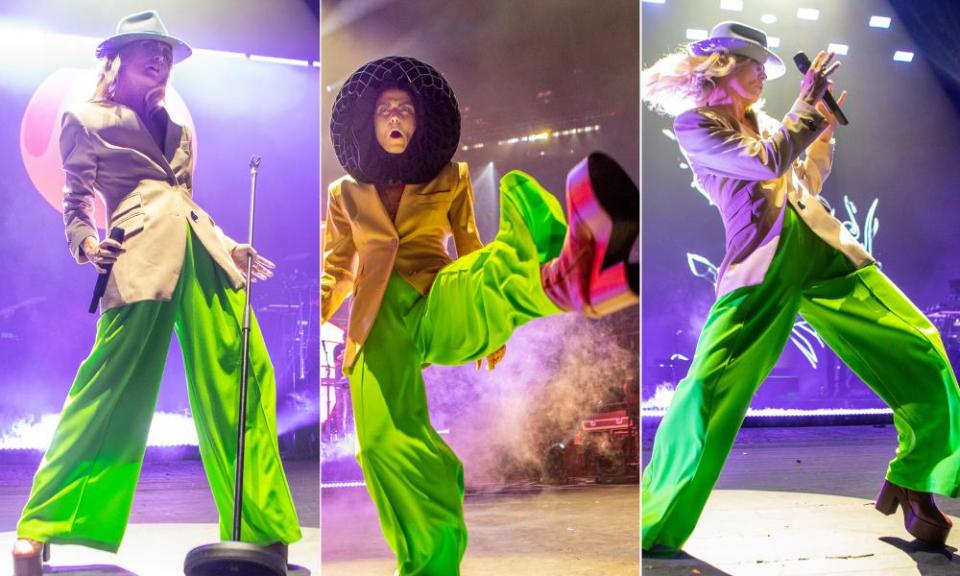Róisín Murphy review – a triumphant dancefloor workout

Róisín Murphy stalks across the stage clad in a fluffy pink lion’s mane headdress and a vinyl skirt, looking like a Dr Seuss character failing to blend in at an S&M club. She comes to a standstill, leans over and extends an arm and a leg, as though doing yoga in high winds.
Dance-pop divas – the good ones – tend to be idiosyncratic.And then there’s Murphy – imperious, teetering and knowing at the same time; a bone fide club-chart crossover dancefloor hero who doesn’t dance so much as kick her way out of a box repeatedly.
“Rrrrah!” the Irish-born, Manchester- and Sheffield-raised singer growls, as her four-man live band ramp up the pressure behind her. A riot of trippy cartoon visuals throb with colour on a giant screen at the rear. “Music! Rrrrah! Music! Music! Music!” she yells. Although a number of female artists have flown the flag for disco and house music over lockdown, this is emphatically not a Dua Lipa gig.
Murphy’s eulogy for music itself feels like an epiphany of sorts; the climax of a set dedicated to working everything out on the dancefloor: heartbreak, curiosity, even abstract ideas. Murphy has songs about the possibility that we might be living in a simulation. Desire and regret crop up as well, naturally. But she comes at these sideways too. “Am I incapable of love?” she wonders repeatedly on the throbbing, relentless Incapable.
Close your eyes, take away the visuals, and this gig still works as a great night out
Those who recall Murphy as the singer of the trip-hop-adjacent 90s dance act Moloko will remember her refusal, back then, to unthinkingly endorse a whole shopping list of “girl singer” cliche – as well as a powerful voice that could uncannily ape the US soul singers who turned up on house tracks. Apparently, Grace Jones’s seminal 1985 album Island Life had pride of place on the mantelpiece in the front room of a friend’s house, searing itself into the young Murphy’s consciousness.
Even in her Moloko days, she preferred outre get-ups – the sort of thing now thought to be the preserve of Lady Gaga. Tonight, Murphy has also brought along a hat that suggests both The Handmaid’s Tale and beekeeping, and, for a disco cut called Narcissus, a black honeycombed cowl that makes her look like a microphone on legs.
For all the costume changes and the stagecraft – the gig starts with a camera crew following Murphy backstage – these are not the show’s most memorable takeaways. It’s the music: a tougher take on the mainstream’s pop-disco fetish, born of a lifelong understanding of clubland as a hedonistic refuge for oddballs, rather than the sleek latterday superclub experience of the past couple of decades. Or worse – the testosterone bro-step of EDM.
If tonight’s setlist is relatively short, the songs Murphy plays are often slowly unfurling extended versions, mainly drawn from her much-feted 2020 album, Róisín Machine. Previous works also receive a tensile update; Overpowered, from 2007, is much better now than it ever used to be.
The lively spirit of April’s Crooked Machine, the remix album by Murphy’s production foil Richard Barratt (AKA DJ Parrot, AKA Crooked Man), resonates as well. Murphy may very much be the sort of glamorous figure who would own a villa in Ibiza, but she and Parrot, whose credits include The All Seeing I’s 1998 hit Beat Goes On, started out in the eclectic, febrile Sheffield scene of the late 80s and early 90s, when genre divides were fluid and FON (“fuck off Nazis”) Studios, set up by Moloko’s Mark Brydon, and a nascent Warp Records, channelled the city’s burgeoning left-field dance culture.
As a result, Murphy and Barratt handle the core tenets of house, disco and techno with a knowledgable hand – and savvy feet. “I’ve learned a lot about the structure of music by dancing to it,” she told the Faith fanzine recently. “It’s like making music into a 3D space … like making a sculpture or a drawing with your body that can only serve to reinforce your understanding of its structure.”
Related: ‘We’re trying to sneak into people’s minds and hearts’: Laurie Anderson meets Róisín Murphy
Close your eyes, take away the visuals, and this gig still works as a great night out. Simulation is cut and shut with its sterner remix, known as Assimilation. Another album standout, Shellfish Mademoiselle, cleaves closer to its even more percolating alter ego, Crooked Madame. “How dare you sentence me to a lifetime without dancing?” asks Murphy – a line that resonated particularly hard last year.
If her set seems slightly familiar, though, you might be one of the circa 5,000 people who tuned in last November to Murphy’s Mixcloud live stream, which also featured hydraulic eyeball flowers – putting the acid back into acid house, if you will. Tonight’s sumptuous two-hour gig butts up hard against the curfew. Minutes often go by during which Murphy dispenses entirely with the business of singing pop songs. She’ll vogue, or reanimate some acid house moves, letting the beat take over.

 Yahoo Finance
Yahoo Finance 